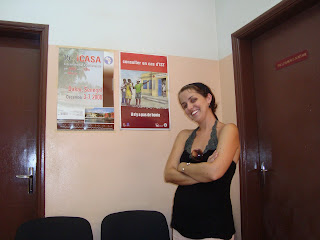
Last week I had another “never thought I’d be doing this” experience—an AIDS/HIV test! No it was not another one of my sick, “why not/ porque no/ pourquoi pas?” moments. I had to get the test for my visa and admission to AU-Cairo. For those who are not familiar with the procedure, as I was not, it’s a simple blood test (‘simple’ for those that don’t have phobias of medical facilities and procedures). In Dakar, there are many, many facilities that do the test for free. I had to fight a bit to get my name on it for bureaucratic reasons because normally it is done anonymously. The ladies were exceptionally nice and I got my results back within 20 minutes! “absence of HIV antibodies” it read.
The experience was overall very interesting because I had no idea how to deal with the topic culturally. I haven’t been able to feel if it is still a taboo topic, if its “o.k.” to talk about with immediate family members or if I could go public. I had no idea how people would react; would they believe it was really for Egypt or would they think it was just a cover up for an unscrupulous personal life? So, not knowing what to do but not having any shame in the process and feeling I couldn’t hurt anybody, I thought I would whole heartedly help in the destruction of the taboo status…I told almost everybody I know! No problems.
Also in true Senegalese style, as I was going through the “Pre-test counseling” the lady asked my marriage status and once she found out that I was single without a boyfriend in the States and I’ve some how, beyond her wildest imagination, have managed to live in Senegal for 5.5 months w/o boyfriends offered to introduce me to all of her brothers and male cousins. When I politely refused she warmly assured me that I’d for sure find a husband in Cairo! Look at that, HIV counseling and Relationship counseling all in one and for free! What more can a girl ask for?!
HIV Test…check that one off the list…

 You know the feeling when your heart is happy? When the muscle emulates the smile of the Valentine’s Day symbol? I feel that this morning…J I just spent another Saturday morning at Ibou’s workshop making ceramics, helping lil’ kids paint their masterpieces and joking with deaf and mute young adults.
You know the feeling when your heart is happy? When the muscle emulates the smile of the Valentine’s Day symbol? I feel that this morning…J I just spent another Saturday morning at Ibou’s workshop making ceramics, helping lil’ kids paint their masterpieces and joking with deaf and mute young adults.
 Since St. Louis, I have spent every available Wednesday and Saturday morning there in silent laughter. They have even started to teach me French Sign Language! And to further emphasize my amazement described in my last blog—those employees that manage to hear some sounds and can ‘grunt’ back in response (sorry, I don’t know the appropriate term) understand and can respond in French and Wolof! Even though they can’t talk, they’re bi-lingual!
Since St. Louis, I have spent every available Wednesday and Saturday morning there in silent laughter. They have even started to teach me French Sign Language! And to further emphasize my amazement described in my last blog—those employees that manage to hear some sounds and can ‘grunt’ back in response (sorry, I don’t know the appropriate term) understand and can respond in French and Wolof! Even though they can’t talk, they’re bi-lingual!
